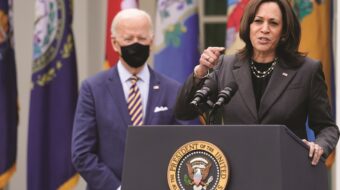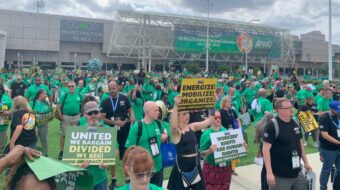HOLLYWOOD, Fla. – Victor Hidalgo is a man on a mission. Even though the outspoken father of four was fired from his job as an unloader at a Cintas industrial laundry facility in Connecticut, he still goes to his plant nearly every day, to bring fliers to his co-workers and to keep the organizing drive going. Hidalgo and his fellow workers are part of a nationwide campaign with UNITE, the Union of Needletrades, Industrial and Textile Employees, to build a union for the nation’s industrial laundry workers.
Hidalgo, a native of El Salvador, described his $9 an hour job. “Three of us worked hard to unload 32 trucks a day,” he told the World. “We have to unload and separate – shop towels, kitchen towels, towels from health clubs, and uniforms from shops like mechanics or waste management.” Hidalgo says the smell of the laundry that has been sitting in closed bags for days can be overpowering, but that’s not his main concern.
Hidalgo is worried about safety, and that’s what led to his firing. “We had to handle uniforms from the Red Cross, spattered with blood. I stood up at a meeting and asked for gloves and safety equipment. Instead of giving us the gloves, they showed us a film about safe practices and the need to get hepatitis injections. Because I had spoken up, they offered to me to get the hepatitis injection, but not to all the workers. At the meeting, I asked for hepatitis protection for all the workers.” The laundry was soon abuzz with union activity. Hidalgo continued, “Next they had captive meetings. They locked all the employee doors for three or four days. Everyone could only go in or out the truck dock. If there was a fire, many people would not be able to leave. We passed out leaflets saying this was against the fire law. Finally they opened the doors.”
Not long after the “safety” meeting, management called Hidalgo into the office, demanding he sign a paper saying he had read the company rule book. Since this was the first he had ever even heard of the rule book’s existence, he figured it was a trick and refused to sign. Referring to the legal rights even workers in non-union shops have, Hidalgo said, “I took out the card the union gave me and said, ‘The law says I have the right to a witness.’ They said, ‘We don’t know that law and anyway, one of us here in this room can be your witness.’ There were four people in the room – the plant manager, my supervisor, the lady from personnel and me. I said, ‘No, I want who I want to be my witness.’ Then they fired me.”
Cintas supplies and launders uniforms worn by 5 million workers in America. With $2.3 billion in sales, they were named top outsourcing business in the Fortune 2002 survey. Their website claims to be in touch with a half million business customers “who need our services to run their businesses every day.” Their participation in basic industry can be seen by a list of their corporate customers: Chevron, Delta, Exxon, Ford, General Motors, Firestone, Kraft, Sears and UPS.
Richard Farmer, one of the Republican Party’s largest contributors, is Cintas’ chairman and founder.
Cintas’ 300 facilities have a work force of 17,000, mostly women and people of color, including a large immigrant component. The company’s low wages set the standard for the industry, and their union busting practices include buying up unionized competitors and shutting down their organized facilities.
But UNITE, having made industrial laundry one of its core industries with the addition of 40,000 laundry workers to its membership in the last four years, seems ready and able to take on the Cintas empire.
At the recent meeting of the AFL-CIO Executive Council, UNITE president Bruce Raynor pledged “We are going to show the power of the people.” Raynor, who became president of UNITE in 2001, was the leader of the Southern region of Amalgamated Clothing and Textile Workers Union, one of UNITE’s predecessor organizations during the 10-year period when it organized 20,000 new members. He played a major role in the successful drive to organize workers at J. P. Stevens dramatized in the 1979 movie Norma Rae.
The union has added hundreds of organizers to assist in the “card check” campaign, in which, rather than going through the National Labor Relations Board process, the union demands company recognition when a majority of workers have signed cards.
Raynor acknowledged organizing Cintas could be a long and difficult struggle, but, he told the World, “We’re in it for the long haul.”
The author can be reached at rwood@pww.org
PDF version of ‘UNITE to organize Cintas industrial laundry’











Comments